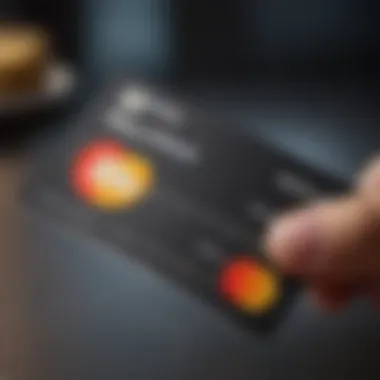Mastercard Business Debit Cards: Zero Liability Benefits


Intro
In today’s fast-paced business landscape, managing finances effectively is not merely an option but an essential strategy for sustainable success. For business owners and financial enthusiasts, understanding the nuances of payment methods can significantly influence how operations run. One such modern method gaining traction is the Mastercard Zero Liability Business Debit Card.
With this financial tool, businesses not only gain convenient access to funds but also enjoy a layer of protection against fraudulent activities. This article navigates through the specifics of these cards, exploring the advantages they offer while dissecting their underlying security mechanisms. The subsequent sections will elucidate the relevant terminology, common acronyms, and valuable insights from finance experts, all tailored for both novice investors and seasoned financial managers alike.
Investment Terminology
Navigating the financial world without a firm grasp on key terms can feel like walking through a minefield. For this reason, it's essential to align yourself with the language and acronyms prevalent in business finance.
Key Terms and Definitions
- Zero Liability Policy: This refers to the safety mechanism by which the cardholder is not responsible for unauthorized transactions made with their card, provided that the loss is reported in a timely manner.
- Business Debit Card: A card linked directly to a business checking account, enabling immediate access to funds for expenditures without incurring credit debt.
- Chargeback: A transaction reversal that occurs when a customer disputes a charge; it's a way to reclaim funds for fraudulent transactions.
- Fraud Prevention: A collection of processes and technologies designed to protect against unauthorized access or theft of financial resources.
Common Acronyms in Finance
- ACH: Automated Clearing House; a network for transferring funds electronically.
- KYC: Know Your Customer; a process of verifying the identities of clients to prevent fraud.
- PCI: Payment Card Industry; standards aimed at securing card transactions against data theft.
- EMV: Europay, MasterCard, and Visa; a global standard for credit and debit card payments featuring embedded chips for enhanced security.
Understanding these terms provides a solid foundation for evaluating the advantages of Mastercard’s zero liability offerings.
Expert Insights
Financial Strategies Overview
Business owners must adopt informed strategies when leveraging debit cards like these. Here are a couple of key considerations:
- Regular Monitoring: Keep a close eye on transactions. Using features that alert you to unusual spending helps identify potential fraud before it gets out of hand.
- Educate Employees: Everyone involved in handling finances should understand the importance of safeguarding card information and recognizing potential scams.
Tips from Financial Advisors
- Use Transactions as a Budgeting Tool: Analyzing spending habits through debit transactions can help outline budgetary constraints effectively.
- Consider Supplementary Accounts: If multiple employees need access, creating separate accounts might enhance security while allowing for easier financial management.
"Mastercard's zero liability policy allows businesses to focus on growth without losing sleep over security issues. It's about empowering your financial decisions, not hindering them."
The following sections will peel back further layers on the operational mechanics and security features of these business debit cards, sealing the connection to better-informed decision-making in the realms of finance.
Preamble to Business Debit Cards
In the modern landscape of business finance, maintaining control and oversight over expenditures is crucial for any organization, be it small or large. Business debit cards offer an effective solution to manage daily transactions while keeping a close watch on financial activities. By utilizing these cards, businesses can streamline their expense processes, allowing for smoother operational management and enhanced financial transparency. The importance of this topic cannot be overstated, as understanding the functionality, benefits, and potential pitfalls of business debit cards is essential for informed financial decision-making.
Defining Business Debit Cards
Business debit cards function much like personal debit cards but cater specifically to the needs of businesses. They allow companies to make purchases directly from their business bank accounts, eliminating the need for carrying cash and promoting a cashless environment. When a business uses a debit card for transactions, funds are immediately deducted, which aids in budgeting and tracking expenses in real-time.
This immediacy not only assists in accurate bookkeeping but also minimizes the likelihood of overspending, as businesses can only spend what they have in their account. These cards often come with additional features designed to enhance usability, security, and tracking for business purposes. With many financial institutions offering tailored options, businesses can choose cards that align with their specific financial habits and growth strategies.
Variations Among Financial Institutions
Not all business debit cards are created equal; there is a fleshed-out distinction among the offerings from different banks and financial institutions. Features such as transaction limits, fees, and reward programs can widely differ, depending on the issuer. For instance, some banks might provide accounts that yield interest on balances, while others may charge monthly maintenance fees or offer lower transaction boundaries.
Additionally, the integration of security features varies. Some cards may include enhanced fraud protection, while others are more basic in this respect. Businesses must carefully examine their intended use cases and compare options across multiple institutions to find a card that meets their needs.
As an example, a company with employees traveling frequently may benefit from a debit card option that allows expenses to be tracked and monitored daily while providing travel-related perks. On the flip side, a local consultancy may opt for a no-frills card to facilitate daily client lunches without needlessly complicated terms.
Understanding these variations is integral for businesses to select a card that provides the maximum benefit for their specific operational needs. This awareness helps organizations navigate the complexities of business debit cards and make choices that enhance financial management.
Understanding Mastercard's Zero Liability Policy
Mastercard's Zero Liability policy serves as a crucial protective umbrella for businesses that rely on debit cards for their transactions. Understanding this policy is vital for companies looking to protect themselves from fraudulent activities that can occur in today’s digital landscape. This section will delve into the core principles of the policy, the legal ramifications associated with it, and how it stands in comparison to other liability frameworks within the financial sphere.
Core Principles of Zero Liability
Zero Liability means that users are not held accountable for unauthorized transactions made with their Mastercard debit card. This can include instances where someone gains access to your card information and makes purchases without your consent. The core principles encapsulate the following aspects:
- Prompt Reporting: To benefit from this protection, the cardholder must report any unauthorized transactions promptly. Generally, this is defined within a specific time frame set by Mastercard.
- Fraud Protection Technology: Mastercard employs sophisticated technology to detect and prevent fraud, ensuring that suspicious transactions can be identified quickly. This means fewer fraudulent transactions make it through before action is taken.
- Broad Scope: The policy covers all transactions processed using the Mastercard debit card, whether online, in stores, or at ATMs. This comprehensive coverage is essential for businesses that operate across multiple channels.


Legal Implications
The legal implications of the Zero Liability policy can be both beneficial and complex. On one hand, the policy acts as a strong safeguard for businesses; on the other hand, it prompts a need for understanding legal nuances:
- Adherence to Notification Requirements: If a business fails to report unauthorized transactions within a given period, they may lose the benefits of the policy. This requirement highlights the necessity for vigilance in monitoring business accounts.
- Dispute Resolution: Mastercard provides mechanisms through which businesses can challenge unauthorized charges, yet the process can sometimes be lengthy or convoluted, depending on the level of evidence provided.
- Jurisdictional Variance: The effectiveness and enforcement of the Zero Liability policy can differ from one region to another, given varying local regulations. Businesses must be aware of this and how it might affect their operations across different jurisdictions.
Comparison with Other Liability Policies
When putting Mastercard's Zero Liability policy under the microscope, comparing it with other liability policies illustrates where it stands:
- Visa’s Zero Liability Policy: Similar in concept, Visa's policy also protects businesses against unauthorized transactions. However, distinctions might arise in the technicalities of reporting and timing requirements, so it’s wise to compare the details closely.
- Bank-Specific Fraud Protections: Some banks offer their protection plans that can come with additional restrictions or requirements, sometimes even placing more onus on the business to handle fraud prevention.
"A well-informed business is a secure business. Understanding the nuances of liability policies is essential for effective financial management.”
- Credit Cards vs. Debit Cards: While credit cards may offer similar protections, the way liability is managed often differs between the two. This can affect how businesses choose to manage expenses and risk with their financial tools.
In summary, grasping the significance of Mastercard's Zero Liability policy is indispensable for safeguarding business interests. This protective measure not only mitigates risk but also promotes a focused and strategically sound approach to financial operations.
Key Features of Mastercard Zero Liability Business Debit Cards
This section dives into the key features of Mastercard's zero liability business debit cards. Understanding these features helps businesses navigate their financial management with more assurance and control. One could think of these cards as a safety net, providing a robust framework for handling transactions while ensuring that unforeseen circumstances don’t derail a business’s finances.
Enhanced Security Measures
Security concerns have never been more pressing in the digital age. Mastercard addresses this with stringent protocols that help reduce fraudulent activities. These measures include advanced encryption technologies and biometric authentication processes, making it more difficult for unauthorized parties to access your funds.
For instance, a fingerprint or facial recognition scan serves as an added layer of protection when making transactions. This ensures that even if someone gets hold of your card information, they won't have easy access to your account. Because let's face it, losing money to fraud is nobody's idea of a good time.
"A secure payment option is as essential as the business it supports."
Transaction Monitoring
Another significant feature is the transaction monitoring system that Mastercard employs. This system works day and night, tracking transactions for any irregularities. Imagine it like having a vigilant watchdog that keeps an eye on your financial activities.
Real-time alerts and notifications can be set up to inform business owners immediately of suspicious transactions. This means that if an unauthorized charge appears, you can act swiftly instead of finding out weeks later when you review your statements. This proactive approach makes all the difference, especially for companies that deal with numerous transactions daily.
Integration with Accounting Tools
The integration capabilities that Mastercard provides are remarkable. Many businesses use accounting software like QuickBooks or Xero to keep track of their finances. The zero liability debit card syncs seamlessly with these platforms, allowing for automatic expense tracking and reporting.
This feature saves time and minimizes errors, enabling business owners to focus on strategic decisions rather than being bogged down with manual entries. Plus, having an organized overview of spending fosters more informed financial planning. It’s akin to having a personal accountant at your fingertips, ready to dissect every transaction.
In sum, the features of Mastercard's zero liability business debit cards are designed to boost security and operational efficiency. They empower businesses to maintain better oversight of their finances while reducing risk. With such attributes, it becomes evident why these cards are gaining traction among businesses looking for a reliable financial tool.
Benefits of Utilizing Mastercard Zero Liability Business Debit Cards
Understanding the benefits of Mastercard's zero liability business debit cards is crucial for business owners and financial managers. Not only do these cards provide essential features for everyday transactions, but they also play a significant role in enhancing financial management and operational efficacy. The zero liability policy acts as a safety net for businesses, protecting them from fraudulent charges, which is becoming increasingly essential in today's digital-first world.
Financial Control for Businesses
One of the standout advantages of these debit cards is the level of financial control they offer. Unlike credit cards, business debit cards allow for direct access to the funds that a business already has, which helps an enterprise avoid falling into a debt trap. This system promotes prudent spending habits because the available balance dictates expenditures.
Moreover, the integration of real-time tracking features enables businesses to monitor transactions as they occur. This can help management catch any anomalies right away, rather than finding out during a monthly reconciliation.
- Avoid Debt: Spending is limited to current account balances.
- Real-time Tracking: Business owners can watch expenses unfold in real-time, which not only improves cash flow management but also allows for swift corrections if needed.
Facilitation of Employee Expenses
Managing employee expenses can be a logistical headache, typically requiring complex processes for reimbursement or prior approvals. Mastercard zero liability debit cards can simplify this cumbersome area significantly. Companies can issue debit cards to staff, enabling them to incur expenses directly linked to business operations without the hassle of out-of-pocket spending.
This setup encourages smoother expense handling while maintaining accountability.
- Direct Access: Employees for procurement or travel can use the cards directly, which minimizes delays and confusion.
- Expense Tracking: Financial managers can review expenditures made by employees in real-time, making it easier to validate compliance with budget constraints.
Attraction of Targeted Customer Segments


In a competitive business landscape, companies need to find ways to attract specific customer segments. Offering Mastercard zero liability business debit cards can enhance a company’s value proposition, particularly among clients concerned about payment security. The knowledge that fraudulent activity won’t result in financial liability can give potential customers the assurance they need to engage with your business.
Additionally, promoting these debit cards can position a business as modern and in tune with technological advancements.
- Security Concerns: Customers are increasingly wary of fraud. Having a trusted card can attract them.
- Competitive Edge: Companies that prioritize secure forms of payment can differentiate themselves in the market.
Ultimately, adopting Mastercard zero liability business debit cards not only streamlines financial operations but also builds trust with clients and boosts employee satisfaction. This multifaceted utility allows businesses to manage their financial health effectively while embracing innovations in payment technologies.
Challenges and Considerations
When approaching the realm of Mastercard's zero liability business debit cards, it is essential to navigate the complexities of both benefits and potential pitfalls. This section will unpack the critical challenges that come with digital transactions, fraudulent claims, and the management of spending limits. Understanding these factors is not just a precaution but a vital part of informed decision-making for businesses.
Risks Associated with Digital Transactions
In today's fast-paced environment, digital transactions have become the lifeblood for countless businesses, allowing for quick, efficient payments. Yet, they are not without their drawbacks. Cybersecurity threats lurk around every corner, and businesses using Mastercard zero liability debit cards must be vigilant. Hackers employ increasingly sophisticated methods to infiltrate systems, steal data, and process unauthorized transactions.
The experience of many companies teaches a crucial lesson: if you think your business is too small to be targeted, think again. Small businesses can become prime targets due to lax security measures. Therefore, it's imperative to invest in robust cybersecurity solutions and to ensure that employees are trained in recognizing phishing scams and other malicious activities.
Key Risk Factors to Watch:
- Inadequate employee training on digital security
- Failure to implement strong passwords and updates
- Not regularly monitoring transactions for suspicious activity
Understanding Fraudulent Claims
Another significant aspect of utilizing Mastercard's zero liability policy is the risk posed by fraudulent claims. Not all claims stem from external attacks. Sometimes, employees may attempt to manipulate the system, claiming expenditures that did not occur or exaggerating expenses. This not only poses a financial risk but can also foster mistrust in the workplace.
Establishing clear guidelines about acceptable expenses is paramount. It’s like drawing a line in the sand; once it’s clear, it’s easier for everyone to abide by it. Regular audits can help mitigate these risks significantly. Furthermore, fostering an open dialogue about expenses and accountability can encourage honesty in reporting.
"Creating an atmosphere of trust is as crucial as having robust controls in place."
Management of Exceeding Limits
Mastercard zero liability business debit cards often come with certain spending limits. While this can be beneficial in keeping budgets in check, it can also lead to challenges. Businesses may find that employees exceed these limits, leading to transaction denials that can disrupt operations. If an employee needs to make an urgent purchase and hits a wall because of a limit, it can cause not just frustration, but also financial loss.
To handle this scenario effectively, businesses need to implement a transparent and flexible system for managing limits. Here are a few strategies:
- Utilizing tiered spending limits for different levels of employees or departments, depending on their needs.
- Establishing a protocol for exceeding limits that allows certain requests to be considered promptly.
- Regularly reviewing spending trends to adjust limits based on actual usage and business growth.
These proactive steps can ensure smooth operations while still protecting against overspending. Balancing access and security is the name of the game, leaving businesses empowered rather than encumbered by their financial tools.
How to Obtain a Mastercard Zero Liability Business Debit Card
Acquiring a Mastercard Zero Liability Business Debit Card is not as straightforward as just signing up online. It combines understanding eligibility, navigating the application process, and preparing necessary documentation. This section reveals why knowing these elements is essential for a smooth experience. A well-informed approach can save time and increase the likelihood of approval, ultimately helping businesses manage their finances more effectively.
Eligibility Criteria
Before diving headfirst into the application, it is important to check if your business qualifies for a Mastercard Zero Liability Business Debit Card. Generally, eligibility is tied to the type of entity you operate, such as a sole proprietorship, partnership, or corporation. Here are some common criteria:
- The business must have a valid Employer Identification Number (EIN).
- A business checking account at a participating bank or financial institution is usually required.
- The entity should be in good standing, meaning no outstanding tax issues or legal problems.
- The business's creditworthiness can also be a factor; however, these cards typically have less emphasis on personal credit scores than credit cards.
Once you confirm that your business meets these criteria, you're one step closer to obtaining the debit card.
Application Process
The next step involves submitting an application, which varies depending on the financial institution. While some banks allow online applications, others might require in-person visits. Here’s the general method you can expect:
- Research Institutions: Not all banks offer the same level of service or benefits, so compare options first. Look for institutions that are known for their favorable terms on business debit cards.
- Fill Out Application: Once you settle on a financial institution, complete the application with accurate information about your business. This usually includes your business’s legal name, address, and EIN.
- Initial Review: After submission, the institution will conduct an initial review for eligibility.
- Approval Process: In most cases, approval can take anywhere from a few minutes to a few days. If there are any issues, the bank will more likely reach out to you directly.
Documentation Requirements
Documentation is often the unsung hero of the application process. Some financial institutions can be strict about these requirements. While specific needs vary, here are the commonly required documents:
- Business license or certificate of incorporation: This validates that your business is legally registered.
- Tax identification papers: Proof of your EIN is crucial for tax purposes.
- Financial Statements: Depending on the lender, this could include recent income statements or balance sheets.
- Identification: A government-issued ID of the business owner may also be needed to verify your identity.
By gathering these documents ahead of time, you streamline the overall process, which can save you from headaches down the line.


In summary, knowing how to obtain a Mastercard Zero Liability Business Debit Card involves understanding the eligibility criteria, navigating the application process, and preparing necessary documentation. This knowledge puts businesses in a stronger position to manage their finances while enjoying the protective benefits that come along with Mastercard’s zero liability policy.
Integration with Business Operations
In today's fast-paced business environment, the integration of financial instruments, particularly debit cards, within daily operations cannot be overstated. Mastercard's Zero Liability Business Debit Cards have been meticulously designed to bridge the gap between spending and financial oversight, fostering a seamless incorporation into routine business activities. This section dives into what makes these cards critical to business operations, highlighting elements such as efficiency in transactions and enhanced visibility in financial dealings.
Using Debit Cards for Daily Transactions
Every day, businesses engage in countless transactions — be it purchasing supplies, settling utility bills, or covering employee expenses. Utilizing Mastercard Zero Liability Business Debit Cards streamlines this process. By leveraging these cards, organizations can enjoy several benefits:
- Speed and Convenience: Transactions are executed swiftly, minimizing delays that can occur with checks or cash. Employees can make necessary purchases immediately, supporting operational agility.
- Control Over Spending: Companies can set limits on spending per cardholder, enabling tighter control over budgets and reducing the chance of overspending.
- Instant Tracking: Each transaction can be monitored in real-time, providing businesses with an up-to-the-minute understanding of their financial standing.
Integrating these cards into everyday transactions not only speeds up operations but also enhances the accountability of expenses. With enhanced security features, like real-time alerts for unauthorized transactions, companies can rest easier knowing that their finances are safeguarded.
Accounting and Financial Reporting
When it comes to accounting practices, the integration of Mastercard Zero Liability Business Debit Cards delivers another layer of efficiency. Accounting teams often face the daunting task of reconciling expenses, but with these debit cards, the process becomes more straightforward:
- Automated Record Keeping: Transactions made with these cards can often be linked directly to accounting software, reducing the manual effort required to log expenses. This means less time spent on administrative duties and more on strategic planning.
- Improved Transparency: With each transaction documented and readily accessible, businesses can produce clear financial reports showcasing their spending habits and capital allocation.
- Easier Auditing Processes: Comprehensive records simplify the auditing process, allowing for quicker assessments and increased credibility with stakeholders.
"Efficient financial reporting not only aids in operational decisions but can also dramatically enhance the overall health of a business's finances."
Future Trends in Business Debit Cards
As businesses continue to evolve in the fast-paced digital landscape, understanding future trends in business debit cards becomes paramount. These trends not only highlight innovations but also shape how businesses manage their finances, improve security, and streamline operations. This section takes a closer look at the trends that may impact how these financial tools function in the next few years.
Innovations in Payment Security
Security in financial transactions has grown to be a central concern for businesses. As more transactions move online, card fraud and related threats have increased significantly. Innovations in payment security are designed to counteract such threats.
One notable development is the implementation of biometric authentication methods. Instead of traditional PINs, businesses may turn to fingerprint recognition or facial scanning to enhance transaction security. This adds an extra layer of verification that can reduce the likelihood of unauthorized access.
Encryption technology is also advancing. New methods create unique, temporary codes for each transaction. By doing this, even if a hacker intercepts a transaction, the data will be useless since it can only be used once. This kind of innovation can significantly decrease the exposure of sensitive financial information.
Here are some additional security innovations worth noting:
- Tokenization: This technique replaces sensitive card information with a generated token, making it harder for fraudsters to access actual card details.
- AI-Powered Monitoring: Using machine learning, systems can analyze transaction patterns and spot anomalies, flagging potentially fraudulent activities in real-time.
- Two-Factor Authentication (2FA): This requires a second form of identification, like a text message or email confirmation, before completing transactions.
As these technologies gain traction, more businesses will prioritize payment security, fostering trust and reliability in their financial dealings.
Emerging Payment Technologies
In parallel with security enhancements, emerging payment technologies are reshaping business debit card usage. New technologies have not only streamlined transactions but have also provided businesses with robust tools for financial management.
One major force in this arena is the rise of mobile wallets. Platforms like Apple Pay or Google Pay allow transactions via smartphones, making it easier for businesses to conduct day-to-day transactions. No longer confined to physical cards, payments can be executed in a quick and convenient manner.
Furthermore, blockchain technology is starting to carve out a niche in the debit card sector. By decentralizing transactions, blockchain can offer businesses a transparent, tamper-proof method of tracking expenses. This might lead to a shift away from traditional banking processes toward more decentralized financial models.
Here's a glimpse at some emerging technologies that could change the landscape of business debit cards:
- Contactless Payments: Fast and simple, this method allows users to pay by tapping their card or device, reducing the physical interaction with payment terminals.
- Cryptocurrency Integration: As cryptocurrency adoption grows, some financial institutions may start offering business debit cards that support transactions in digital currencies.
- Augmented Reality (AR) for Enhanced User Experience: Imagine seeing your account balance and spending habits visualized in AR when shopping. This could transform how businesses and consumers view their financial health.
Finale
In wrapping up this exploration of Mastercard's zero liability business debit cards, it becomes quite clear that these cards are not just another tool in the control toolbox for businesses, but rather a vital asset that can significantly shape financial dealings. The zero liability policy serves as a reassuring compass for both novice and seasoned business owners. It reduces the burden in case of unauthorized transactions, allowing one to navigate through the murky waters of financial responsibilities with greater confidence.
Recapitulation of Key Insights
Through the layers laid out in the previous sections, we uncovered several key insights regarding Mastercard's approach to business debit cards. First off, the enhanced security measures stand out prominently. The technology behind these cards provides multiple layers of defense against fraud, which is an ever-present threat in today’s digital economy. Moreover, the transaction monitoring allows businesses to keep a vigilant eye on expenditures, ensuring that no questionable charges slip through unnoticed.
Financial control is another crucial benefit that was highlighted throughout this article. With features designed to facilitate employee expenses and streamline reporting, companies can enhance efficiency significantly. The integration with accounting tools was also touched on, presenting a holistic view of a business's financial health by linking card transactions directly with accounting software. Altogether, these insights accentuate that a Mastercard zero liability business debit card isn’t merely a transactional tool—it’s part and parcel of a strategic financial framework.
Encouragement for Informed Decision-Making
As we conclude, it’s vital to point out that informed decision-making is not just advisable; it’s crucial. By understanding the intricacies of Mastercard's offerings, you empower your business to choose the right financial tools that cater to your needs. Whether you’re a small start-up or a large enterprise, assessing your financial habits and risks is paramount before diving into applications.
Consider conducting a thorough review of your business expenses, security requirements, and the available options. A detailed analysis will frame a clearer picture of how Mastercard’s zero liability card could meet specific demands. This way, you can align your financial practices with industry standards while also securing the peace of mind that comes from robust protection against fraudulent activities.
Taking this step towards informed decision-making is not just beneficial; it’s foundational for sustainable growth in any business environment.
"Success is where preparation and opportunity meet." - Bobby Unser
Arm yourself with knowledge, explore the options provided by Mastercard, and set your business on a path of secure and efficient financial management.















